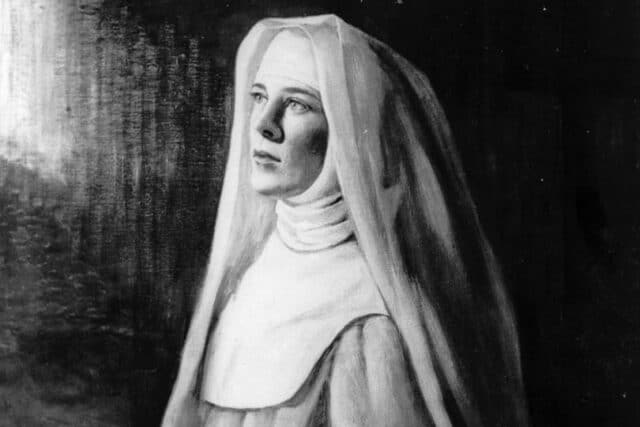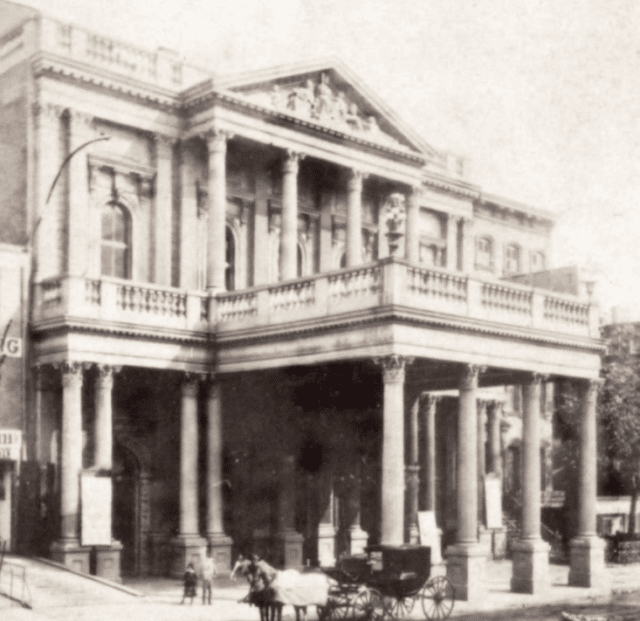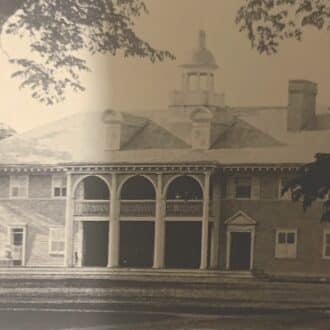By: Katie Birenboim (She/Her/Hers)
Devoted fans of BTG may gasp to discover that until doing a first round of research in the amazing BTG archives, I had never heard the name “Eva Le Gallienne.” I knew that the Playhouse “opened” officially on June 4, 1928, and that the illustrious opening night, besides being an event attended by the who’s who of the American theatre at the time, marked the first phase of BTG’s artistic history, one colored by figures like Tallulah Bankhead, Thornton Wilder, James Cagney, Montgomery Clift, and Claude Rains and the apprenticeship of then-unknown actress Katherine Hepburn. But unlike many devoted BTG fans, or even just historians of the theatre who are likely shaking their heads in disbelief as they read, I was not familiar with Eva Le Gallienne’s work or the significance of her performance of The Cradle Song all those years ago. As something of an actress/director/producer/writer myself, however, I’ve come to be fascinated with all things Eva Le Gallienne, and, after reading Helen Sheehy’s fantastic biography (courtesy of Kate Maguire) and doing some research of my own, I’ve found there’s so much more to her than even a casual BTG fan may know. I’ve also come to believe that her connection with BTG and its history is one the theater should loudly proclaim and cultivate.

Eva Le Gallienne in The Cradle Song, 1928.
Eva Le Gallienne, born in 1899, was the daughter of famed English poet Richard Le Gallienne and ahead-of-her-time Danish journalist Julie Nørregard. By the time she was twenty-two, Eva had established herself as a veritable Broadway star, garnering universal praise for roles in Arthur Richman’s Not So Long Ago and Ferenc Molnar’s Liliom; more may know her for her roles as the White Queen in Alice in Wonderland, Peter in Peter Pan, Queen Elizabeth I in Mary Stuart, or for her Oscar-nominated work in the 1980 film Resurrection. It’s virtually impossible to cover all of the highlights of Eva Le Gallienne’s life and career because she worked in so many different genres: she wrote several books, including two autobiographies, definitive translations of the work of Henrik Ibsen and Hans Christian Anderson, as well as a children’s book about country hens; she was an out-and-proud lesbian before virtually anybody was talking about gender or sexuality, a sexual assault survivor, an avid fan of gardening and animals, and a voracious reader. But the quality of Eva Le Gallienne by which I’m most fascinated, and which most connects to Berkshire Theatre Group and its history, nay, the history of the American theatre in general, is her failed theater company, the Civic Repertory, with which she opened Cradle Song and the Berkshire Playhouse on that fateful night in 1928.
Fed up with the Broadway system, Eva wrote in the 1920s that “here in America…the theatre is a business like any other business. Its sole reason for existing [is] to make money.” Beyond that, she wondered why opera houses, symphony houses, and art museums were funded by the federal and state governments, but theatre “was an outcast.” Why was there no National Theatre, Moscow Art Theater, or Comedie-Francaise equivalent in America? From these questions Eva built a company with a simple mission: “To have a People’s Repertory Theatre, presenting the best plays – with fine acting and productions – at the lowest possible prices.” “Don’t speak of this to anyone,” Eva admonished her mother in a 1926 letter. It must be “correctly handled.”
Despite her secrecy and sense of insecurity on the subject – indeed, Eva had only directed one play prior to forming the Civic, and had never managed money in her life – by October 25, 1926 the  was born, complete with a large, storied space on Fourteenth Street and Sixth Avenue and a company of some fifteen-odd actors who would rehearse and perform plays in true repertory fashion (rehearsing one during the day, while performing the one you learned the week before at night). Ticket prices were capped at $1.50 (adjusted for inflation, that’s well below even the best 30-under-30 deals on Broadway today), and because the Civic was located “far too downtown for Broadway audiences,” it attracted a truly diverse group of patrons, many of whom were blue collar workers who traveled into the heart of the city on the IRT, the BMT, the Hudson Tubes, or the Sixth Avenue Elevated. In its heyday, the Civic enjoyed great success – critics “raved” about the quality of the plays presented, the directing, and the “brilliance of the ensemble” structure; the house was almost always selling at 95% capacity; and subsequent tours after the twenty-week New York City season (most often consisting of SEVEN plays performed in rep) gave the Civic notoriety far and wide. Brooks Atkinson called it the most “interesting theater in New York.”
was born, complete with a large, storied space on Fourteenth Street and Sixth Avenue and a company of some fifteen-odd actors who would rehearse and perform plays in true repertory fashion (rehearsing one during the day, while performing the one you learned the week before at night). Ticket prices were capped at $1.50 (adjusted for inflation, that’s well below even the best 30-under-30 deals on Broadway today), and because the Civic was located “far too downtown for Broadway audiences,” it attracted a truly diverse group of patrons, many of whom were blue collar workers who traveled into the heart of the city on the IRT, the BMT, the Hudson Tubes, or the Sixth Avenue Elevated. In its heyday, the Civic enjoyed great success – critics “raved” about the quality of the plays presented, the directing, and the “brilliance of the ensemble” structure; the house was almost always selling at 95% capacity; and subsequent tours after the twenty-week New York City season (most often consisting of SEVEN plays performed in rep) gave the Civic notoriety far and wide. Brooks Atkinson called it the most “interesting theater in New York.”
In 1932, however, the Civic fell victim to the Great Depression: Eva refused to compromise on the price issue, and the fortunes of backers like Otto Kahn and Mary Bok began to dwindle. Indeed, while the Civic was one of the first American theaters to be subsidized – the blueprint for the nonprofit model we have today, Eva was never able to garner the public funding she craved, and truly create a “National Theatre.” In fact, while FDR offered her the job of heading up the Federal Theater Project in 1933, Le Gallienne refused. Eva reportedly felt that an initiative predicated solely on giving out-of-work artists jobs would “encourage [artistic] mediocrity…” To cultivate a “theatre-mindedness in the American public comparable to that in European countries,” Eva wrote, “it was mandatory to bring them only the highest possible standard of performance.” And indeed, when the Federal Theatre Project itself failed after just four years, its dynamic leader Hallie Flanagan said that its “double identity as a relief organization and artistic enterprise” was the cause.
The Civic failed too – but it had, as Helen Sheehy writes, successfully “united a young American theatre tradition with a rich European heritage,” introducing the United States to the works of Henrik Ibsen, Anton Chekhov, and in many ways to the “repertory” approach. What’s more, as Sheehy explains, Eva and the Civic “formed the philosophical bedrock for Off-Broadway and nonprofit institutional theatres…” In that way, almost every nonprofit theater in the country, from the smallest Off-Broadway blackbox to the biggest LORT house, owes a major debt to Eva Le Gallienne. Helen Sheehy goes on to write that Eva and the Civic “flung out a challenge yet to be answered,” a thesis I believe points to Eva’s ambitions at establishing not only a subsidized, “people’s theatre,” but a NATIONAL theatre of the United States. And perhaps through its connection to Eva Le Gallienne and the Civic Repertory company, as well as its history of producing and cultivating some of the greatest works and talent of American theatre since that first production of Cradle Song in June 1928, the Berkshire Theatre Group can attempt to meet that “challenge” in its new century.
Sources:
Sheehy, Helen. Eva Le Gallienne: A Biography. Alfred A. Knopf, 1996.
Krienik, Barrie. “Not Only For Amusement: Eva Le Gallienne and the Civic Repertory Theatre.” Medium. https://theaterhound1.medium.com/not-only-for-amusement-eva-le-gallienne-and-the-civic-repertory-theatre-fa8a7e4e331e.
The Berkshire theatre Group Archives


